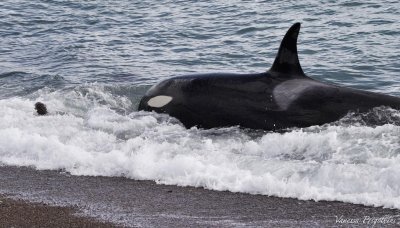Marine educator and photographer Vanessa Prigollini was left in awe after she witnessed a rare encounter between an orca and a sea lion on the Valdes Peninsula of Argentina.
The 20-foot male, called Emyr, swam right up to the shore to catch the 6.5-foot sea lion in an impressive demonstration of the hunting tactics used by these apex predators.
"I was feeling a wide roller coaster of emotions," Prigollini told Newsweek. "I was impressed, stunned, amazed, excited, happy, nervous and grateful for being able to witness such a unique event from nature which is not easy to see. Part of you wants the sea lion to get away, but part of you understands it's nature and orcas are the apex predators of the ocean."
Orcas, also known as killer whales, are one of the ocean's most formidable predators. They can be found in all of the world's oceans in both open seas and coastal water. Despite their name, killer whales are not actually whales—they are dolphins. According to the National Oceanic and Atmospheric Administration, orcas can grow to lengths of up to 32 feet, weighing up to 11 tons.



As a species, orcas have an extremely varied diet, although each of the individual populations has developed specialized hunting tactics usually for a smaller range of locally abundant prey items. There are even some that have specialized to prey on sharks.
Although it is rare to see orcas so close to the shore in many places, Prigollini said that it was not uncommon on the Valdes Peninsula.
"It's a hunting technique that some orcas in Argentina have developed," she said. "I saw around five orcas approaching the area with the sea lion colony and looking at them while the pups got into the water."
Prigollini spent eight to nine hours at the beach, watching the orcas and studying their behavior.
"It was a dream that I had since many years ago to see this population of orcas in Argentina hunting sea lions," she said. "I know I was very lucky to see it because it's a matter of being at the right place at the exact time. I spent several days and many hours with tough weather conditions wanting to witness this. Patience pays well when it comes to nature."
Prigollini educates people on the lifestyles of these powerful predators.
"I use my photography to teach people about orca culture and traditions, which in this photograph is very evident," she said. "I want people to understand that orcas belong to the wild, not in concrete tanks in marine parks, in captivity.
"By showing these behaviors, like the one in the picture, I want to show people how wrong and unethical it is to have the apex predator of the ocean in a marine park performing silly tricks to entertain people.[...]Their behavior in the wild has NOTHING to do with their behavior in captivity."
Prigollini shared photos of the encounter to her Instagram page, @vaneprigo, in a post that has been liked hundreds of times.
"Wow what a moment," one user said.
"What a beautiful friend," another said.
Uncommon Knowledge
Newsweek is committed to challenging conventional wisdom and finding connections in the search for common ground.
Newsweek is committed to challenging conventional wisdom and finding connections in the search for common ground.
About the writer
Pandora Dewan is a Senior Science Reporter at Newsweek based in London, UK. Her focus is reporting on science, health ... Read more





